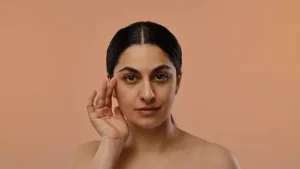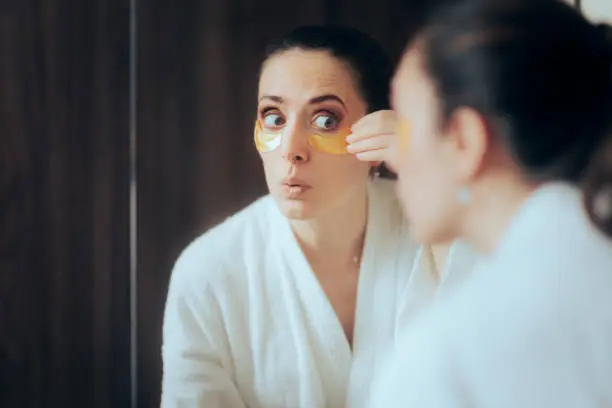Dark circles can make you look tired, older, or just plain stressed—no matter how you’re feeling. If you’ve tried everything from cucumbers to concealers, it might be time to bring in the big guns: retinol eye cream. Let’s dive deep into what makes this a game-changing solution for stubborn dark circles. Retinol eye cream for dark circles
Understanding Dark Circles
What Are Dark Circles?
Dark circles are the shadowy patches that form under your eyes. They can be bluish, purplish, brown, or even reddish, depending on your skin tone and what’s causing them.
Main Causes of Dark Circles
Genetics
If your parents have them, there’s a good chance you will too. For some individuals, the skin beneath the eyes is naturally more delicate, which can make underlying blood vessels appear more prominent.
Sleep Deprivation
When you don’t get enough sleep, your skin can lose its healthy color, making the blood vessels under your eyes stand out more and appear darker..
Aging and Skin Thinning
With age, your body produces less collagen, causing the skin, especially under the eyes, to thin and become more prone to visible dark circles. That’s when the hollows under your eyes start to show.
Allergies and Pigmentation
Allergies can trigger inflammation and swelling, while hyperpigmentation causes darker skin around the eyes.
Lifestyle Factors
Smoking, alcohol, dehydration, and too much screen time can all add to the problem.
What is Retinol?
- The Basics of Retinol
Retinol, a form of vitamin A, is one of the most researched and proven ingredients in skincare. It boosts cell turnover and stimulates collagen production, helping to improve skin texture and firmness.
- How Retinol Works on Skin
Retinol penetrates the skin and speeds up cell renewal. This not only fades pigmentation but also improves skin texture and firmness.
- Retinol vs. Retinoid – What’s the Difference?
Retinoids are the stronger, prescription-only forms of vitamin A, whereas retinol is a milder version that you can easily find in over-the-counter skincare products.
Why Retinol for Dark Circles?
- Boosts Collagen Production
Collagen helps to fill and firm the under-eye area, diminishing the look of dark hollows and shadows.
- Improves Skin Texture and Tone
Retinol smooths the skin, making it look more youthful and even-toned.
- Reduces Fine Lines and Wrinkles Around the Eyes
Bye-bye crow’s feet. With regular use, you’ll see a visible reduction in lines.
- Fades Hyperpigmentation
Retinol gradually breaks down excess melanin, the pigment responsible for dark discoloration.
How to Choose the Right Retinol Eye Cream
- Strength of Retinol
Begin with a low concentration—around 0.1% to 0.3%—to minimize the risk of irritation. You can increase strength over time.
- Supporting Ingredients
Look for hyaluronic acid (hydrates), niacinamide (brightens), and peptides (firm the skin).
- Fragrance-Free and Gentle Formulas
Fragrance can irritate sensitive under-eye skin. Go fragrance-free when possible.
- Packaging Matters
Choose opaque, air-tight tubes or pumps to preserve retinol’s potency.
Best Retinol Eye Creams for Dark Circles
- Budget-Friendly Picks
The INKEY List Retinol Eye Cream
RoC Retinol Correxion Eye Cream
- Luxury Options
Murad Retinol Youth Renewal Eye Serum
SkinCeuticals Retinol 0.3 Eye Cream
- Dermatologist-Recommended Products
Neutrogena Rapid Wrinkle Repair Eye Cream
La Roche-Posay Redermic R Eyes

How to Use Retinol Eye Cream Safely
- Start Slow – Less Is More
Use a pea-sized amount 2–3 times a week initially.
- Nighttime Only Routine
Retinol increases sun sensitivity, so apply it only before bed.
- Follow With Moisturizer
Seal it in with a nourishing eye cream or gel to prevent dryness.
- Always Use Sunscreen in the Morning
This is non-negotiable. Protect your under-eye area with SPF to prevent further pigmentation.
Realistic Expectations – When Will You See Results?
- Short-Term Improvements
Within a few weeks, you may notice softer skin and a slight reduction in dark pigmentation.
- Long-Term Changes
Most users see significant results in 8–12 weeks with consistent use.
Common Side Effects and How to Avoid Them
- Dryness and Peeling
Combat this with a hydrating eye cream and less frequent use.
- Redness and Irritation
Choose a gentle formula and avoid layering multiple active ingredients.
- How to Minimize Reactions
Apply on top of a light moisturizer if your skin is sensitive. Known as the “retinol sandwich” method.
Natural Alternatives to Retinol for Sensitive Eyes
- Bakuchiol
A plant-based alternative with similar benefits but gentler on the skin.
- Caffeine Eye Creams
Great for de-puffing and improving circulation.
- Vitamin C-Based Formulas
Brightens skin and fights free radicals.
Retinol Eye Cream Myths – Debunked
“Retinol Thins the Skin”
False. Retinol thickens the dermis by boosting collagen.
“You Can’t Use Retinol Around the Eyes”
Outdated. Modern formulations are designed specifically for delicate eye skin.
“Retinol Works Instantly”
Nope! It takes consistency and patience to see full results.
Tips for Enhancing Results
- Pair With a Healthy Sleep Schedule
Beauty sleep isn’t a myth. Your body repairs itself at night.
- Stay Hydrated and Eat Antioxidant-Rich Foods
Hydrated skin = happy skin.
- Reduce Eye Rubbing and Tugging
Be gentle when applying products and removing makeup.

When to See a Dermatologist
- If Retinol Isn’t Working
A professional can assess whether pigmentation or vascular issues are the main culprit.
- For Prescription Strength Options
Sometimes, you need a stronger formula to see real results.
Summary – Should You Try Retinol Eye Cream for Dark Circles?
Absolutely, yes—if you’re looking for a science-backed solution to dark circles. Just make sure to use it correctly and consistently. It’s not a magic wand, but it sure comes close with time.
Conclusion
Retinol eye cream can be a game-changer in the battle against dark circles. With consistent use, the right formulation, and a little bit of patience, you can say goodbye to tired-looking eyes and hello to a brighter, smoother, more youthful under-eye area. Just remember: start slow, be consistent, and never forget your SPF!
FAQs
Q1: Can I use retinol eye cream every night?
A: If your skin tolerates it well, yes. But start slow—2–3 times a week is ideal for beginners.
Q2: What age should I start using retinol eye cream?
A: Mid to late 20s is a great time to start as a preventative step.
Q3: Can I use retinol eye cream with other skincare products?
A: Yes, but avoid combining with other strong actives like AHAs or vitamin C in the same routine.
Q4: Is it okay to use makeup over retinol eye cream?
A: Absolutely! Just let the cream absorb fully before applying concealer or foundation.
Q5: Will dark circles go away permanently with retinol?
A: Retinol can significantly improve dark circles, but factors like genetics may require ongoing treatment or additional interventions.

